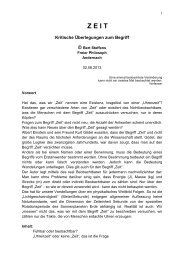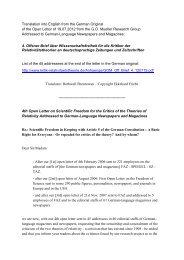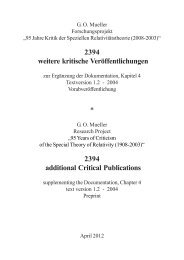1. The Need of New Approaches - Kritische Stimmen zur ...
1. The Need of New Approaches - Kritische Stimmen zur ...
1. The Need of New Approaches - Kritische Stimmen zur ...
You also want an ePaper? Increase the reach of your titles
YUMPU automatically turns print PDFs into web optimized ePapers that Google loves.
Serial Numbers 3295 - 3933 / 2008-03-05<br />
Chapter 9: <strong>The</strong> Thought Experiment<br />
Open Letter on Scientific Freedom<br />
Sent to the 639 Members <strong>of</strong> the<br />
Vereinigung der Deutschen Staatsrechtslehrer<br />
[Society <strong>of</strong> German Constitutional-Law Teachers]<br />
At a conference held in October 2005 the Society <strong>of</strong> German Constitutional-Law Teachers had addressed the<br />
topic <strong>of</strong> “Grund und Grenzen der Wissenschaftsfreiheit” [Reasons for and Limitations <strong>of</strong> Scientific Freedom]. In<br />
their publication <strong>of</strong> volume 65, “Kultur und Wissenschaft” [Culture and Science], Berlin 2006, they had reported<br />
on this (pp 110-237). <strong>The</strong> society’s statutes (pp 609-611) envisage in section § 1, point 3, the possibility <strong>of</strong> public<br />
statements made by the society.<br />
Enclosed: 1 CD-ROM with all <strong>of</strong> the publications <strong>of</strong> the research project.<br />
In the “Open Letter” G. O. Mueller formulates, as a layman in the field <strong>of</strong> jurisdiction after reading the “Bonner<br />
Kommentar” [Bonn Commentary] on the German constitution and the interpretations given at the conference held<br />
by the society, the legal position <strong>of</strong> the project in 10 theses, and requests examination <strong>of</strong> the submitted problem <strong>of</strong><br />
scientific freedom in theoretical physics.<br />
Extracts:<br />
“<strong>The</strong>sis 1 - Scientific freedom is decisive for an open, critical and fruitful development <strong>of</strong> every special field.<br />
<strong>The</strong>sis 2 - Scientific freedom implies the participation <strong>of</strong> the representatives <strong>of</strong> all <strong>of</strong> the various positions in<br />
the scientific dialogue and in the research funding <strong>of</strong> a subject.<br />
<strong>The</strong>sis 3 - Scientific freedom is guaranteed in Article 5, point 3 <strong>of</strong> the German Constitution as a basic right that,<br />
in keeping with Art. 1, paragraph 3 <strong>of</strong> the German Constitution (“<strong>The</strong> following basic rights oblige legislation,<br />
executive powers and the judiciary as directly valid law.”) is directly valid, i.e. needs no further special law and no<br />
instruction or ruling by any other authority to establish its validity.<br />
<strong>The</strong>sis 4 - A limitation or refusal <strong>of</strong> scientific freedom vis-à-vis individual scientists in a specialist field would<br />
constitute a violation <strong>of</strong> this person’s basic rights.<br />
<strong>The</strong>sis 5 - <strong>The</strong> expulsion and complete exclusion <strong>of</strong> critical minority viewpoints from a specialist field by the<br />
majority <strong>of</strong> this specialist field would not only be a serious violation <strong>of</strong> the basic rights <strong>of</strong> individuals, but would<br />
also amount to the abolition <strong>of</strong> this basic right for the entire specialist field.<br />
<strong>The</strong>sis 6 - A complete exclusion <strong>of</strong> minority viewpoints from a specialist field would also violate the freedom<br />
<strong>of</strong> choice <strong>of</strong> career, which is also guaranteed by the German Constitution, in that persons interested in pursuing the<br />
career in question but expressing critical views as to the dominating majority view would be refused permission to<br />
sit their final academic examinations.<br />
<strong>The</strong>sis 7 - According to civil-service law, the civil servants representing an academic science in senior<br />
positions are obliged, through their oaths <strong>of</strong> <strong>of</strong>fice, to abide by the Constitution and to take an active role, at all<br />
times, in supporting the enforcement <strong>of</strong> the Constitution. With the complete exclusion <strong>of</strong> critical minority<br />
viewpoints from the scientific discussion <strong>of</strong> a specialist field the civil-servant representatives <strong>of</strong> this specialist field<br />
would abolish the basic right <strong>of</strong> all scientists <strong>of</strong> the specialist field to scientific freedom and would thereby break<br />
their oaths <strong>of</strong> <strong>of</strong>fice. (As a reminder: in the Federal Republic <strong>of</strong> Germany there have already been cases involving<br />
applicants who were rejected solely on the suspicion that they might not necessarily take action in support <strong>of</strong> the<br />
146<br />
G. O. Mueller: STR 2012





